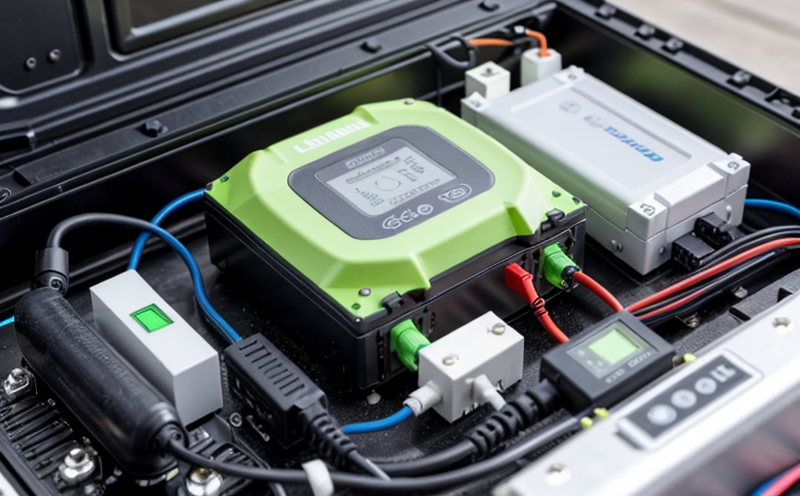IEC 62928 Lithium-Ion Battery Testing for Railway Vehicle Applications
The International Electrotechnical Commission (IEC) standard IEC 62928 is a critical specification that ensures the safety and reliability of lithium-ion batteries used in railway vehicle applications. This standard covers the testing methods, acceptance criteria, and reporting requirements essential for compliance with international regulations.
IEC 62928 addresses various aspects of battery performance, including electrical characteristics, mechanical durability, thermal stability, and safety features. It is particularly relevant to the railway sector due to the high energy density and power output required by modern trains. The standard aims to protect both passengers and staff while ensuring that batteries perform reliably under all operating conditions.
The testing process outlined in IEC 62928 involves a series of rigorous procedures designed to simulate real-world scenarios. These tests are conducted on lithium-ion cells, modules, packs, or complete systems depending on the level of detail required for the application. The primary goal is to ensure that batteries meet stringent safety and performance standards before integration into railway vehicles.
The standard includes detailed test methods for evaluating various parameters such as internal resistance, impedance frequency response, voltage profile, charge retention capacity, and self-discharge rate. Additionally, it provides guidelines for assessing the thermal behavior of lithium-ion batteries through tests like heat dissipation capability, overcharging tolerance, and short-circuit protection.
Compliance with IEC 62928 is essential for manufacturers aiming to enter or maintain a presence in the global market for railway vehicle applications. By adhering to this standard, companies can demonstrate their commitment to quality control, safety, and regulatory compliance. This not only enhances brand reputation but also facilitates smoother interactions with regulators, insurers, and other stakeholders.
Our laboratory offers comprehensive services tailored to meet the requirements of IEC 62928, providing clients with accurate test results and detailed reports that are essential for certification purposes. Our experienced team uses state-of-the-art equipment to conduct all specified tests in accordance with international standards. This ensures that our findings are reliable and consistent across different samples.
By leveraging advanced testing capabilities and adhering strictly to IEC 62928, we help ensure the highest level of safety and performance for lithium-ion batteries used in railway vehicles. Our services cater specifically to quality managers, compliance officers, R&D engineers, and procurement professionals who are responsible for ensuring that their products meet stringent regulatory requirements.
Our approach combines rigorous adherence to international standards with practical industry knowledge, enabling us to provide tailored solutions that address each client's unique needs. Whether you require assistance with initial prototype testing or ongoing production validation, our team is committed to delivering accurate and timely results that exceed expectations.
| Test Parameters | Internal Resistance |
|---|---|
| Impedance Frequency Response | Voltage Profile |
| Charge Retention Capacity | Self-Discharge Rate |
| Thermal Behavior | Overcharging Tolerance |
| Heat Dissipation Capability | Short-Circuit Protection |
| Test Case | Description |
|---|---|
| Prototype Evaluation | Evaluating new designs before mass production. |
| Ongoing Quality Control | Maintaining consistent performance across batches. |
| Regulatory Compliance | Satisfying international standards for market access. |
| R&D Support | Assisting in the development of safer and more efficient batteries. |
Our expertise extends beyond just compliance testing; we also offer valuable insights into how IEC 62928 can be integrated into broader product lifecycle management strategies. This includes providing recommendations for improving battery performance, enhancing safety features, and reducing environmental impact through sustainable design practices.
In summary, our comprehensive IEC 62928 lithium-ion battery testing services play a crucial role in ensuring the reliability and safety of batteries used in railway vehicle applications. By partnering with us, you gain access to world-class facilities, experienced professionals, and cutting-edge technology—all aimed at helping you achieve your business objectives while maintaining strict adherence to international standards.
The pursuit of sustainability is a key focus within the railway industry. Lithium-ion batteries play an integral role in this endeavor by reducing reliance on fossil fuels and contributing to cleaner transportation solutions. IEC 62928 not only ensures that these batteries are safe and reliable but also promotes their efficient use throughout their lifecycle.
By adhering to this standard, manufacturers can minimize waste and optimize resource utilization during production processes. Additionally, the robust testing procedures outlined in IEC 62928 help identify potential areas for improvement in terms of energy efficiency, recycling capabilities, and overall environmental impact. This contributes significantly towards creating a more sustainable future for railway transportation.
Our laboratory plays an active role in promoting these green initiatives by offering specialized services that cater to both current compliance needs and future sustainability goals. Through our testing facilities and expertise, we contribute positively to the development of environmentally friendly lithium-ion batteries suitable for use in railway vehicles.
The application of IEC 62928 lithium-ion battery testing spans various aspects of railway vehicle design and operation. Here are some specific examples:
1. Prototype Evaluation: Before introducing a new model into production, manufacturers must ensure that its batteries meet all specified requirements. This involves conducting tests such as internal resistance measurement, impedance frequency response analysis, voltage profile assessment, charge retention capacity evaluation, self-discharge rate determination, and more.
2. Ongoing Quality Control: To maintain consistent performance across different batches of batteries, regular testing is necessary throughout the production process. This helps identify any deviations from expected specifications early on so that corrective actions can be taken promptly.
3. Regulatory Compliance: Meeting international standards like IEC 62928 is crucial for accessing foreign markets and ensuring product safety. Our laboratory assists clients in navigating these regulatory landscapes by providing accurate test results and detailed reports.
4. R&D Support: In addition to compliance testing, our services also support research and development efforts aimed at improving battery performance, enhancing safety features, and reducing environmental impact through sustainable design practices.





